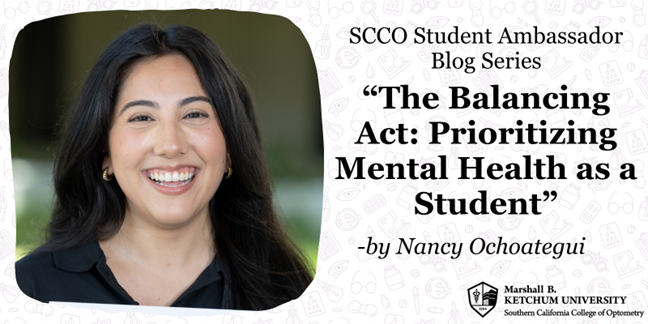Before undergrad, I never considered that my education journey may be emotionally taxing – but it was. Navigating UCLA as a first-generation student was immediately overwhelming. Between struggling to adjust to life away from my family, trying desperately to manage difficult coursework, imposter syndrome, and (poorly) putting on an act that everything was fine, I totally crumbled.
This transition took an immense toll on my mental health, and it was difficult to endure and overcome. At the time, I was extremely embarrassed about what I was ground through and felt alone in my experience, Eventually, I learned that I wasn’t alone, and I want to remind you that you aren’t either. The journey we go on as we pursue this wonderful profession can be difficult at times and it’s normal to encounter moments that challenge us academically, personally, or otherwise.
It's so important for us as students to prioritize our mental health, but it can be hard when we have so many other priorities too. My own experience taught me the importance of finding balance. The balancing act is a delicate practice and looks different for everybody, but one thing is key – you know yourself best. Recognizing your limits and adopting practice that truly helps your mental well-being is crucial.
Listed below are some practices I’ve adopted that help me cope when I feel anxious, stressed, defeated, or all the above.
- Journaling. Taking the time to reflect and work through your thoughts and emotions is helpful and sometimes necessary when life gets overwhelming. Writing is one of my favorite outlets for releasing my feelings and is very cathartic for me.
- Meditating. I enjoy using the Headspace app for guided meditations. It is a subscription-based service, but with the student plan it’s only $10 per year. If you’re looking for a free option, they have free meditations posted on the Headspace YouTube channel!
- Take a walk. Sometimes getting out of my environment helps me get out of a negative mood. It’s totally normal to get stressed out, especially as a student, and it’s important to recognize moments when we need to relax. For me, going on a walk is a perfect activity to get my mind off things and get back in touch with myself.
- Get creative. Being creative in whatever hobbies you love is a fun way to express yourself and take a breather. I love listening to music, so I get creative by making curated playlists centered around specific themes – like little soundtracks! Other creative outlets include content creation, poetry, drawing, makeup artistry, pottery, crocheting... the list goes on!
- Talking to someone. Whether it be a family member, significant other, friend, or therapist, it helps to have someone hear you out and be there for you when times are tough. I’m truly strengthened by the people that make up my support system and I wouldn’t be where I am without them.
Along with those practices, I also want to emphasize this: you must extend compassion toward yourself. Be kind to your mind! It is easier said than done for some of us, I know it is for me, but try not to be so hard on yourself. I was my own worst enemy at times, comparing myself to others, and setting unrealistic expectations of perfection for myself. Reminder: if you pursue this profession genuinely and passionately, you’re doing amazing.
This journey may be challenging, but it is also full of enjoyment and excitement. I’m rooting for you and wish you the best of luck! If you have any questions or would like to reach out, don’t hesitate to email me at nancyochoategui.scco27@ketchum.edu.
Click here to read Student Ambassador bios on our website!

